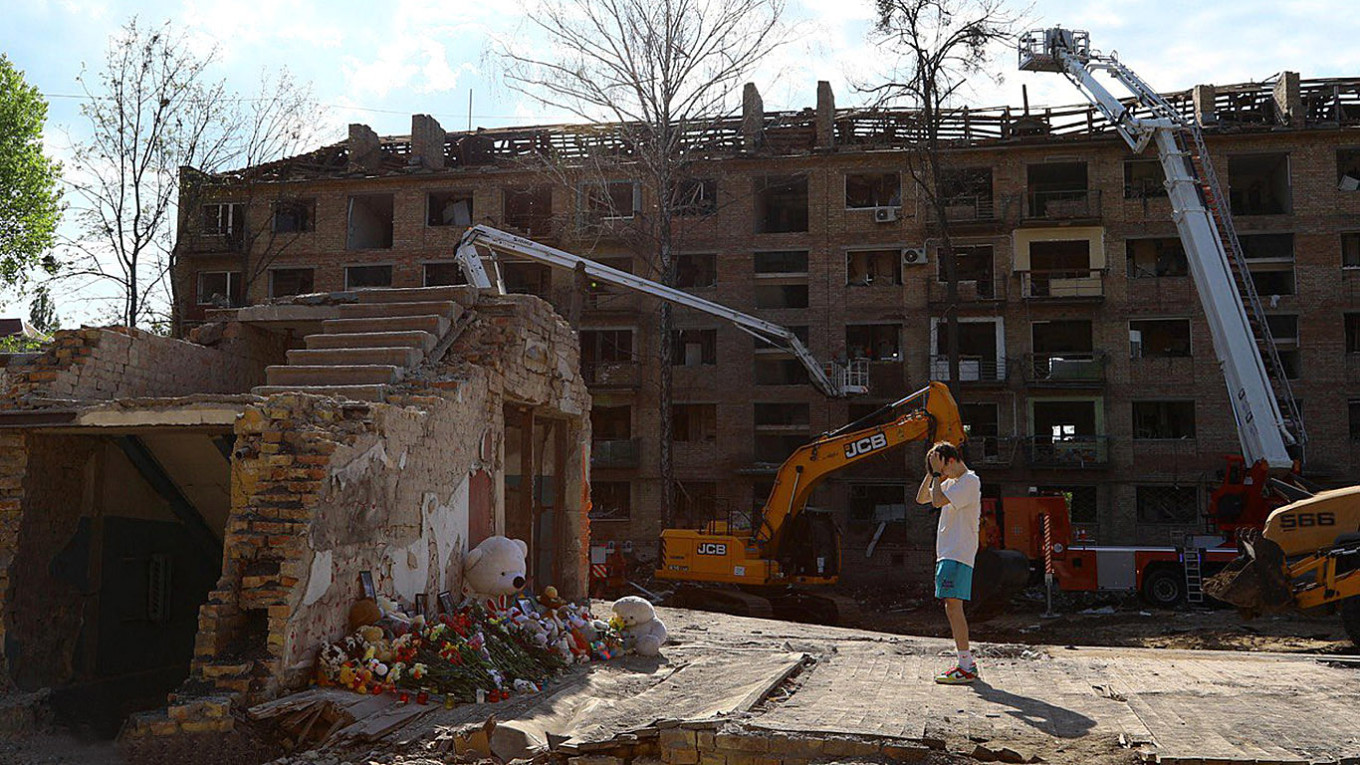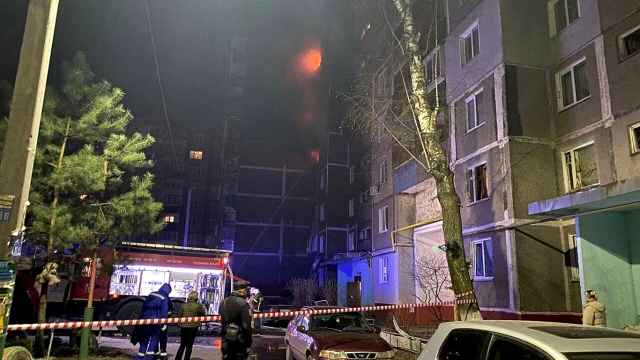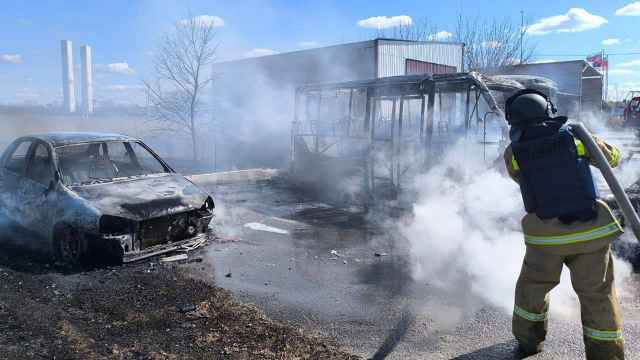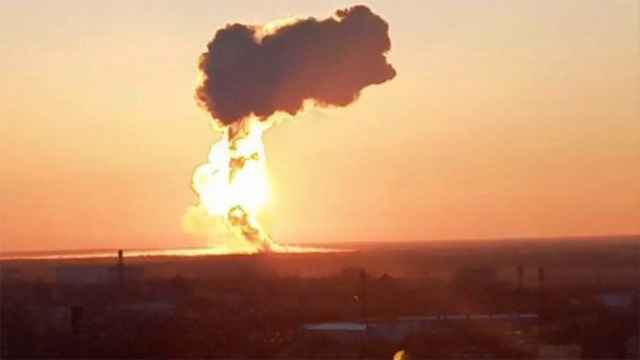Editor’s Note: This article was originally published on May 29. However, Russia’s bombardment of Ukrainian civilians has continued despite ongoing peace talks involving the Kremlin. Hours ahead of Ukrainian President Volodymyr Zelensky’s arrival at the White House, a Russian drone strike on an apartment block in Kharkiv killed seven civilians and wounded nearly two dozen others.
U.S. President Donald Trump was “not happy” with his Russian counterpart, Vladimir Putin, this week. For three consecutive nights, from Friday to Sunday, Russia launched about 900 drones and scores of missiles at Ukraine. At least 18 people were killed, including three children.
“We’re in the middle of talking and he’s shooting rockets into Kyiv and other cities,” Trump told reporters on Sunday, after Putin ordered the largest air assault on Ukraine’s civilians in its three-year war.
Following up on his remarks, Trump posted on social media that Putin had “gone absolutely CRAZY!”
Putin is not crazy. He is a tactician with a long-term goal: to make Russia a great power again and secure his place in the history books as the re-builder of Russia’s imperial might.
Trump announced after a phone call with Putin on May 19 that Russia and Ukraine would “immediately start negotiations” towards a ceasefire.
With his latest air campaign on Ukraine, however, Putin is threatening to destroy the goodwill he’s built up in Washington, where Trump has been consistently soft on Russia and tough on his allies.
So, what is Putin’s strategy? Why is he launching these massive air bombardments on Ukrainian civilians now?
One theory is that these attacks are somehow preparations for a major offensive. That makes little sense.
Attacking military facilities, weapons depots or even frontline troops are useful preparations for an impending attack. Indiscriminate bombing of civilians, meanwhile, is a sign of either desperation or impatience.
Britain and the U.S. bombed German cities during the Second World War because they had no alternatives until they built up enough capacity to transport land forces across the sea to invade the continent.
The U.S. also sent bombers to Japan in the final stages of the war because the American public became tired of seeing their sons, husbands, brothers and fathers die on Pacific islands they had never heard of. The war had dragged on forever by this point, and there seemed no end in sight.
Is Putin desperate or impatient? Likely the latter.
From the perspective of the Kremlin, Russia’s strategic situation is as good as it has been for years.
The U.S. is trying to destroy itself through trade wars and boorish diplomacy. Trump clearly dislikes Ukrainian President Volodymyr Zelensky and hopes the war will somehow end if he just demands it.
Europe is continuing to back Ukraine. However, for the time being, it still needs U.S. support because its entire security structure is built around NATO and U.S. strength, both economic and military.
What Putin sees when he surveys the international scene is weakness. In his thinking, such weakness needs to be exploited — now is the time to hurt Ukraine as much as possible, and hope it will crack. Analysts call this a “cognitive warfare effort.”
Indiscriminate air war on civilians is the only means Putin currently has to pressure Ukraine. His army has been advancing, but painfully slowly. There is no breakthrough in sight, even once the spring muds dry and the summer fighting season starts in earnest.
Russia has gradually advanced in Ukraine throughout 2024, but with no perceivable change in the overall situation. Putin does not command precision weapons or super spies, which he could use to take out Ukraine’s leadership.
All he can do is rain death on women, children and the elderly from relatively cheap, unsophisticated weapons such as drones. He now has these in large supply, thanks to ramping up military production at home.
A strategic air war on civilians seldom works, however.
Japan’s surrender in 1945 is an exception, but it is misleading in many ways. The Americans had flattened Japan’s cities for a while already, just not using their new atomic weapons. Japan had already lost the war and the real question was if there would be a bloody U.S/ invasion or surrender.
And as the U.S. dropped its two nuclear bombs in August of that year, the Red Army joined the fight, racing across Manchuria to help occupy Japanese territories.
In Germany, the British-American bombings from 1942 onwards certainly had an effect on war production, as they killed workers and destroyed factories. But they did not incapacitate the German army and certainly did not break morale.
Instead, the bombings led to embitterment and a closing of ranks around the regime. German society fought to the last moment. It did so not just despite, but because of the air war. The German army was eventually defeated by the ground troops of the Red Army, who took Berlin in an incredibly bloody fight.
Other historical failures are even more spectacular. The U.S. Air Force dropped 864,000 tons of bombs on North Vietnam during an air campaign of more than 300,000 sorties lasting from 1965 to late 1968. The North Vietnamese lost maybe 29,000 people (dead and wounded), more than half of them civilians. The Americans and their South Vietnamese allies still lost the war.
Putin’s air war will likely follow the historical pattern: it has further embittered the Ukrainians, who know very well that what comes from the east is not liberation.
Another summer of fighting lies ahead. Ukraine’s friends in the democratic world need to urgently redouble their efforts to support Ukraine. The misguided hopes that Putin would somehow “make a deal” lie under the rubble his drones leave behind in Ukraine’s cities.
A Message from The Moscow Times:
Dear readers,
We are facing unprecedented challenges. Russia's Prosecutor General's Office has designated The Moscow Times as an "undesirable" organization, criminalizing our work and putting our staff at risk of prosecution. This follows our earlier unjust labeling as a "foreign agent."
These actions are direct attempts to silence independent journalism in Russia. The authorities claim our work "discredits the decisions of the Russian leadership." We see things differently: we strive to provide accurate, unbiased reporting on Russia.
We, the journalists of The Moscow Times, refuse to be silenced. But to continue our work, we need your help.
Your support, no matter how small, makes a world of difference. If you can, please support us monthly starting from just $2. It's quick to set up, and every contribution makes a significant impact.
By supporting The Moscow Times, you're defending open, independent journalism in the face of repression. Thank you for standing with us.
Remind me later.






